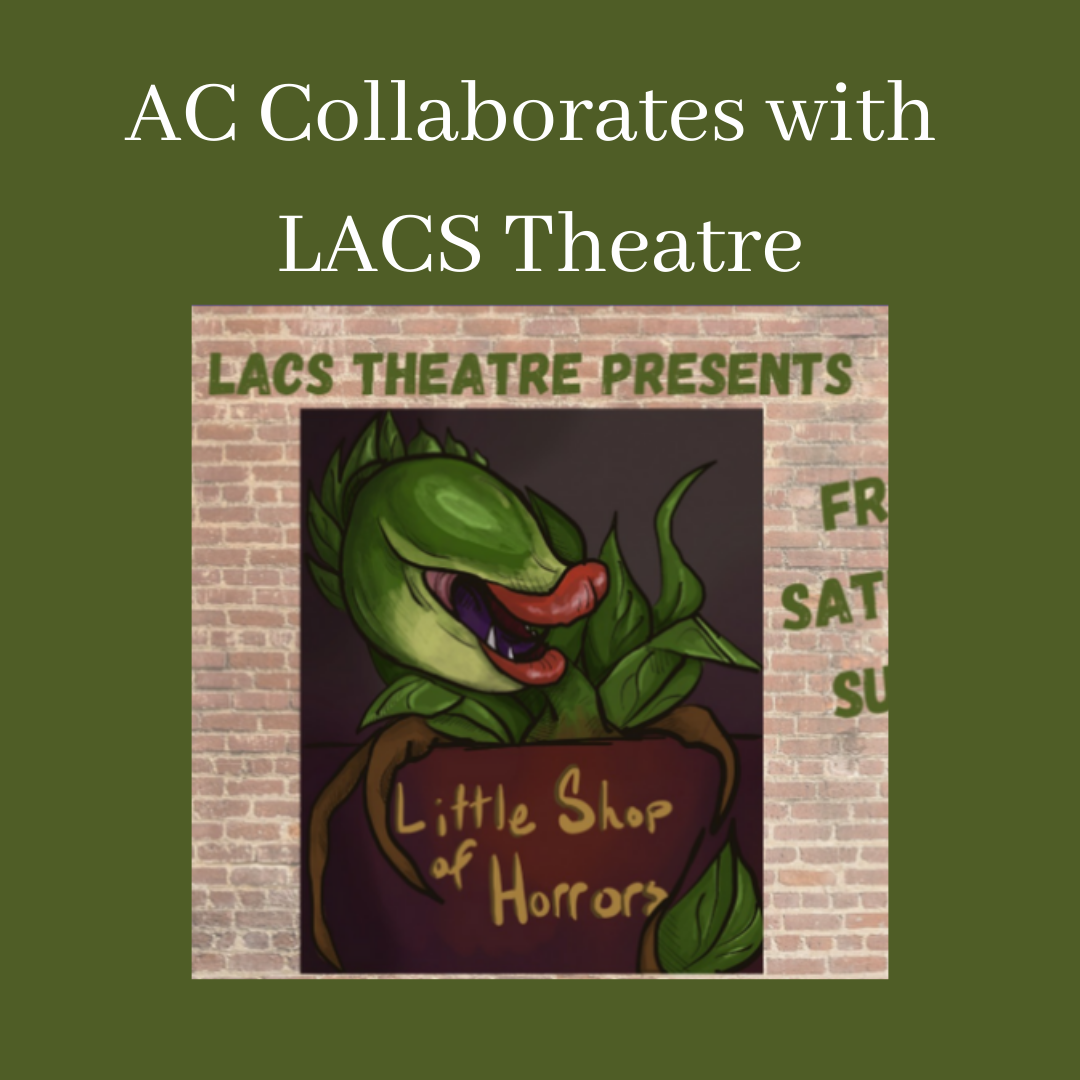by Lyn Staack, Advocacy Center Youth Education Coordinator
LACS Theatre Presents “Little Shop of Horrors”! Director Sharon Costianes says: “Little Shop is funny, and campy, with great music and loveable characters. It has become a classic for good reason! AND it is a show that grapples with some very challenging themes. We are leaning into satire in this production as a way of pointing out these very real and problematic aspects of our world.”
Wow – being able to see LACS Theatre’s production of Little Shop of Horrors in person was incredible! I laughed. I cried. I thought, a lot. Which is exactly as Director Sharon Costianes hoped.
As I write this I realize I have at least three things I want to talk about/do – give a shout out to LACS as a whole and LACS Theatre specifically; write about best practices for preventing sexual harassment and abuse within youth organizations like youth theaters; and share how LACS Theatre approached the dating abuse/domestic violence within Little Shop of Horrors. This a rambling draft with bits of each.
What does the Advocacy Center have to do with Little Shop of Horror?
Within Little Shop’s seductively catchy tunes and over-the-top humor, the tendrils of abuse are everywhere. The show’s love triangle includes Seymour, the sweet, insecure, and overworked clerk at Mushnik’s Skid Row Florist Shop; Audrey, his coworker and not so secret crush, who dreams of a better life even though she doesn’t believe she deserves it; and Orin, Audrey’s tall, dark, handsome, successful boyfriend, who abuses her.
Around them we see emotional desperation, social isolation, desperation, addiction, the characters shaped by – to name a few – racism, classism, sexism, economic oppression. Understanding “-isms” is a crucial part of supporting survivors and preventing interpersonal violence. We know that inequities and power imbalances of all kinds are used as tactics of threat and control by domestic abusers and sexual offenders. Supremacist beliefs — sometimes described as entitlement and/or ‘narcissistic’ attitudes – fuel, excuse, and justify sexual and domestic violence. Further, inequities and discrimination are built into and often perpetuated within the very systems meant to protect and support survivors and hold offenders accountable.
Talking with the cast and crew
Two months ago, in mid December, I was asked to come talk with the cast and crew, students from 6-12th grade, about the dating abuse in LSOH.
But before I write about that meeting, I want to acknowledge the work the entire production team put into creating a space – a culture within this show – that explicitly valued the safety, well being, and importance of each student. The process of creating this container for students and maintaining it through the entire arc of early rehearsals, tech week, performances, and strike is the foundation of youth safety and abuse prevention in theater. Thank you to Sharon Costianes, the show’s director, Elizabeth Seldin, the show’s choreographer, Katherine Gould, the show’s music director, Natty Simson, the show’s technical director, and Lauren Loiacono, the show’s student support/community engagement person. Thank you to the students who came into this space day after day with purpose, courage, patience, and respect for the show and each other. Without your participation, my visit to talk about abuse in Little Shop would have been a short, one-time, one-sided presentation.
Creating safer spaces
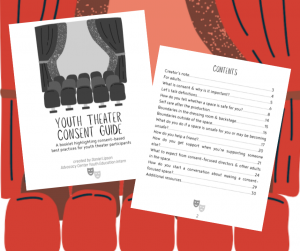 During my first visit, we focused on the importance of safety in youth theater – youth participants deserve to be physically and emotionally safe. We shared copies of the AC booklet A Youth Theater Consent Guide. Written by a former teen intern for teens, the Youth Theater Consent Guide includes “an overview of critical definitions, such as consent, how to tell if a space is safe for you, self care after the production, boundaries in dressing rooms and backstage, boundaries outside of the space, what to do if a space is unsafe for you or becomes unsafe, how to help a fellow participant, what to expect from consent-focused adults, and how to start a conversation about making a consent-focused space. The document focuses on empowering youth theater participants and giving them the tools to speak up.”
During my first visit, we focused on the importance of safety in youth theater – youth participants deserve to be physically and emotionally safe. We shared copies of the AC booklet A Youth Theater Consent Guide. Written by a former teen intern for teens, the Youth Theater Consent Guide includes “an overview of critical definitions, such as consent, how to tell if a space is safe for you, self care after the production, boundaries in dressing rooms and backstage, boundaries outside of the space, what to do if a space is unsafe for you or becomes unsafe, how to help a fellow participant, what to expect from consent-focused adults, and how to start a conversation about making a consent-focused space. The document focuses on empowering youth theater participants and giving them the tools to speak up.”
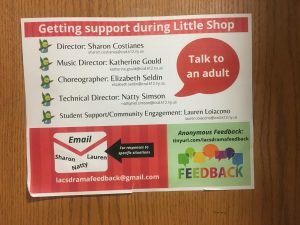 I saw many examples of safety and consent-based theater demonstrated in this show: posters reminding students who to talk with and how to reach them; actors practicing ways to step in and out of character; discussions about characters, costumes, dance steps, and the choreographed interactions between characters; guidelines to make backstage changing spaces comfortable for everyone; reminders from the student stage managers that “we want to leave school spaces cleaner than we found them”; rehearsals that closed with mindfulness and gratitude circles; and in the performances themselves.
I saw many examples of safety and consent-based theater demonstrated in this show: posters reminding students who to talk with and how to reach them; actors practicing ways to step in and out of character; discussions about characters, costumes, dance steps, and the choreographed interactions between characters; guidelines to make backstage changing spaces comfortable for everyone; reminders from the student stage managers that “we want to leave school spaces cleaner than we found them”; rehearsals that closed with mindfulness and gratitude circles; and in the performances themselves.
Diving into challenging content
In inviting me to come talk with the students, the production team made time for students to reflect on the abuse in Little Shop in age appropriate and fully supported ways. There were several levels to the conversations I participated in which I will write about here. Specific discussions about a student’s character, scenes, lines, choreography, costumes, et al, happened with the production team.
We started with what is now commonly called a “content warning”: acknowledging that there are themes, interactions, and lines in the show which are disturbing, which should be disturbing, which will impact us and in turn the audience.
We may be most uncomfortable with the most obvious scenes, like when Orin slaps Audrey. Or, we may be caught off guard and affected by other moments in the show. I know someone who found the scene when Audrey 2 first drinks Seymour’s blood especially difficult to watch. We may or may not know what might “trigger” a deep emotional response in ourselves or someone else before hand.
I reminded them that assuming that abuse topics will be more difficult for abuse survivors is an assumption, and not always accurate. Someone who has processed their own experiences may be more prepared to talk about dating abuse in health class or rehearsals than someone who has not experienced abuse or who has not had opportunities to think or talk about abuse before. My goal is that we learn and practice how to enter potentially difficult scenes or conversations with a commitment to care for ourselves and each other and a commitment to “pause” to process and adjust when anyone asks. Talking is a tool for abuse prevention: moving through our discomfort to greater understanding.
One way we approached learning about dating abuse was through the eyes of the characters, starting with Audrey and moving outward. What do we know about what Audrey felt and thought from the songs, lines and stage directions? The show itself includes many details that match what abuse survivors often say. What factors led her to where we see her at the beginning of the show? What else do students know, and what did they want to know, to understand Audrey’s choices? Following the same process, what do we know about Orin as a character? What is known about men who are abusive in intimate relationships? Does Seymour recognize the signs of abuse before witnessing Orin slap Audrey? Mr. Mushnik, Crystal, Ronette, and Chiffon all notice and comment on Orin’s abuse. This provided us a way to discuss what is it like to to be concerned about someone, and to witness abuse. And connected the show’s messages to our lives, how does this all speak to what students experience and want in their own lives? In addition to enjoying a great show, what do they want audience members to take away from it?
From the audience’s point of view
Depending on her makeup and how she enters, audience members may not realize that the stage directions say “Audrey appears down R sporting a black eye.” But minutes into Act One, inside Mushnik’s Florist Shop, if they are paying attention, the audience hears this exchange between the shop owner and his employee:
Mushnik (quickly moving back into the shop) Audrey, you’d better go back there and see what he’s.. . [referring to Seymour in the back of the shop]
(Mushnik gets a good look at her for the first time.) Audrey, Where’d you get that shiner?
Audrey (evasively grabbing some roses from the window seat and crossing to the down R work table to arrange them) Shiner?
Mushnik Audrey, that boyfriend of yours – he’s been beating up on you again? (She doesn’t answer.) Look, I know it’s none of my business, but I am beginning to think maybe he’s not such a nice boy.
For a whole variety of reasons, directors and choreographers of high school productions of Little Shop make different decisions about how to present the show’s content. Some decide to remove the word “slut” from Orin’s verbal abuse of Audrey; others keep that word because it is still commonly used to demean or ostracize teen girls. Some directors move Orin slapping Audrey to behind a semi-opaque window, reasoning that the audience already knows Orin physically abuses her. Others use the slap as a sharp break in the comedy of the show. However a director approaches that material, Orin’s abusive treatment of Audrey can’t be ignored or removed from the show; it must be talked about and directed intentionally. As Howard Ashman wrote in his author’s note. “There will be a temptation to play [the whole show] for camp and low-comedy. This is a great and potentially fatal mistake. … By way of example, Audrey poses like Fay Wray from time to time. But she does this because she’s in genuine fear…”
Sharon’s vision for this show and willingness to “leaning into satire in this production as a way of pointing out these very real and problematic aspects of our world” guided the choices in this show, at times playing into the comedy and sitting with the seriousness at others.
Including the whole school community
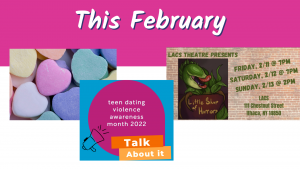
In addition to the thoughtful process happening within the LACS Theatre group, Principle Deb Ptak and LACS staff embraced Little Shop as an educational opportunity for the entire school. LACS student committees have a long history of collaborating with the Advocacy Center to offer activities during February as part of the nationally Teen Dating Violence Awareness Month. This year we organized three events connecting dating abuse, Little Shop of Horrors, and celebrating healthy expressions of love and caring.

One. Family Group leaders shared a few slides about Teen Dating Violence Awareness Month, some examples of abuse that can be seen within Little Shop of Horrors, and information about where students could learn more and/or ask for support. Then each student was invited to think about what healthy interactions look like, in any kind of relationship, and to write one example of what Love Is onto a paper heart. An LACS student, interning with the Advocacy Center this semester, combined the hearts into a display in the front hallway.

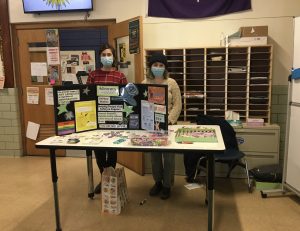 Two. Our LACS student intern and the Advocacy Center’s Youth Educator tabled during lunch, answering questions, and giving out candy. In addition, to working with our student intern from LACS, our Youth Educator has presented in LACS health classes and meet some students through our Teen Survivors Art Group.
Two. Our LACS student intern and the Advocacy Center’s Youth Educator tabled during lunch, answering questions, and giving out candy. In addition, to working with our student intern from LACS, our Youth Educator has presented in LACS health classes and meet some students through our Teen Survivors Art Group.
Three. Lauren Loiacono, the student support/community engagement person for Little Shop of Horrors, and I invited staff to an elective screening and discussion about “Don’t Confuse Love and Abuse.” This short animated video about teen dating abuse is one used by the Advocacy Center Youth Educator in health classes. Seeing the video gave staff a better sense of the warning signs and patterns of abuse in relationships that students learn in health classes and provided a time for them to talk about how learning healthy relationship skills comes up in other classes and school settings.
And, of course, everyone was encouraged to come to Little Shop of Horrors!
Learn more about our Youth Theater Consent Guide and links to the guide here: www.actompkins.org/a-youth-theater-consent-guide/
Advocacy Center Education Department staff can facilitate conversations and education programs with youth and adults about youth safety, sexual harassment/abuse and relationship abuse prevention, and recommended polices and consent-based practices for safety within youth organizations. Contact us by email: info@actompkins.org
Concerned about a teen? call our 24 hour hotline at 607-277-5000.
Learn more about Teen Dating Abuse Awareness Month, prevention and support in New York State: www.ny.gov/programs/teen-dating-abuse-awareness-and-prevention
National website and hotline Love is Respect.org
